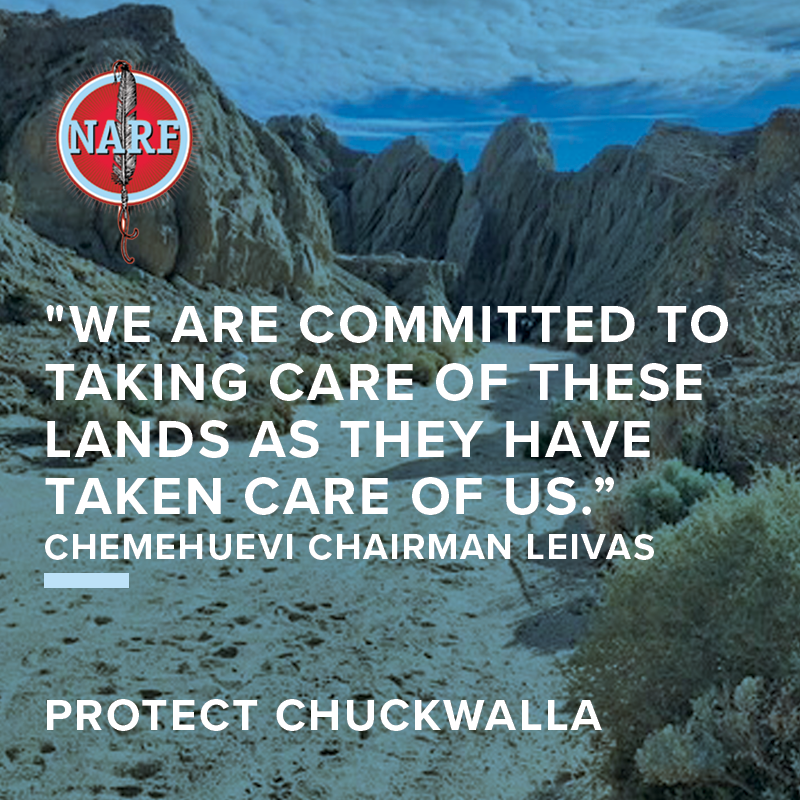On August 11, 2025, on behalf of the Torres Martinez Desert Cahuilla Indians, Fort Yuma Quechan Indian Tribe, Chemeheuvi Indian Tribe, Colorado River Indian Tribes, and Morongo Band of Mission Indians, the Native American Rights Fund filed to intervene in Torongo v. Burgum, a case that threatens the long-sought designation of the Chuckwalla National Monument. Tribal Nations led the effort to establish Chuckwalla National Monument. They were joined by local and state governmental entities, local businesses, California elected officials, and other local organizations. The challenge to the monument is brought in a federal court by a Michigan resident who purportedly has mining claims within the monument boundaries and a national off-road vehicle special interest group.

“For years, we worked with our neighbors across southeastern California to get this monument designation. This unique landscape is valued by so many in the region for its beauty, spirit, and wildlife. For the Torres Martinez, the region embodies our people’s origin stories, cultural traditions, and spiritual practices. We are committed to protecting Chuckwalla,” said Chair Joseph Mirelez, Torres Martinez Desert Cahuilla Indians.
“An important part of the national monument designation at Chuckwalla is that it recognizes the role of Indigenous people in land management. By providing for tribal co-stewardship, the national monument designation brings Native voices to the table and recognizes the value of knowledge that we have passed down from generation to generation,” said President Jonathan E. Koteen, Fort Yuma Quechan Indian Tribe.
“You can find our ancestors’ marks across the Chuckwalla National Monument. Indigenous people have been here since time immemorial, and we are still here today. We continue to come to Chuckwalla and maintain our cultural heritage. Without protections, that heritage is threatened by vandalism and desecration,” said Chairman Charles Martin, Morongo Band of Mission Indians.
As leaders in the original efforts to establish the monument, who possess unique sovereign interests in protecting their traditional homelands, the Tribal Nations in the Chuckwalla region seek to intervene in the suit.
“Tribal Nations led the efforts to protect Chuckwalla National Monument. We have unique interests in this landscape. It is part of our ancestral home, and it is a cultural and religious place that we have spent years working to protect and continue to maintain. We deserve to be heard in the Torongo case,” said Chairwoman Amelia Flores, Colorado River Indian Tribes.
“The connection between the lands, waters, and wildlife of Chuckwalla and our people is hard to express when it comes to shared spiritual cultural sites, areas, and places. We have lived here for so many generations. We are committed to taking care of these lands as they have taken care of us. Getting the national monument designation was one step in that process,” said Chairman Daniel Leivas, Chemehuevi Indian Tribe.
The case was brought in the U.S. District Court for the Eastern District of Michigan, by a national off-road vehicle special interest group and a Michigan man who says he has mining claims within the Monument.
“The Tribal Nations in the Chuckwalla region advocated vigorously to protect their homelands and the many historic and scientific items within Chuckwalla from looting and destruction. As the original stewards of Chuckwalla, they are entitled to participate in the defense against this attack. They are committed to protecting their homelands,” said NARF Staff Attorney Lenny Powell.
Learn more about Tribal Nations’ advocacy for their homelands in the Chuckwalla region.
More blog posts

